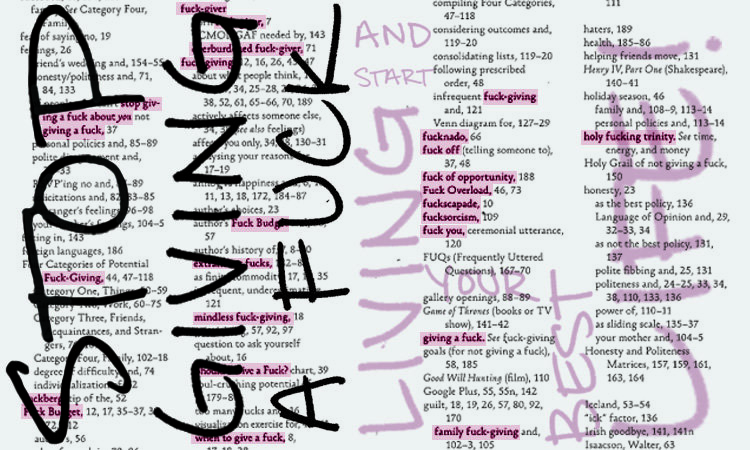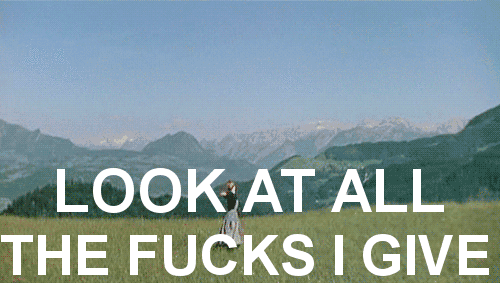
Last year, Sarah Knight quit her job. After fifteen years in the New York publishing world and eight years of giving less and less of a fuck, she left her high-powered job in a high-rise office, to become a freelance writer and editor.
She didn’t give a fuck about how much money she was leaving on the table, or what people thought of her decision. She didn’t want to spend 90 minutes a day on a sweaty subway. She didn’t want to spend her life in meetings, running P&L statements, and eating salads at her desk. She wanted to work for herself. At home. In her pajamas, eating whatever she damn well pleased. She wrote a blog post ‘I Quit My Job Today. (And so can you!)’ on Medium and it quickly went to the top of the site’s front page.
But she not only stopped giving a fuck about her job, she stopped giving a fuck about all sorts of things: basketball, being a morning person, Taylor Swift, reading the New Yorker, going to the gym, the threat of a nuclear Iran, and, most importantly, what other people thought of her.
She stopped hanging out with people she didn’t actually like. She stopped going to her friends’ toddlers’ birthday parties. She stopped watching season two of True Detective after the first episode. She didn’t give a fuck. And by stopping giving a fuck about these things, she realised she had more time, energy and money (her working definition of a ‘fuck’) to dedicate to the things and people in life that she did care about.
She slept more, drank more wine, got a suntan, did the work she wanted to and, of course, got a book deal. The Life-Changing Magic of Not Giving a Fuck (which contains the word ‘fuck’ 730 times* – more than The Wolf of Wall Street but less than Fuck – a Documentary on the Word) is part self-help, part parody, outlining her theories on fuck-giving, offering irreverent, insightful and truly practical advice about how best to give and not give a fuck.

Image c/o The Life-Changing Magic of Not Giving a Fuck
To have graduated Harvard and had a successful corporate career, you must have seriously given a fuck for a while there.
I gave all the fucks for a very long time.
When did you realise that you gave too much of a fuck, or gave too many fucks?
There was a period of eight or nine years between the time I got married and the time I really started advancing in my career and then last summer, after eight years of consideration, I decided to leave my corporate career, which was 15 years in the making.
The fucks that I gave in regards to planning my wedding were very much family oriented and the fucks that I gave in regards to my career were very much work orientated. That’s how I came up with my four categories of fuck giving. I realised that it’s a lot easier to start with inanimate objects, then the workplace and then move your way to friends and then family, which is a lot harder.
Why do people give a fuck? Is it social? Cultural? Upbringing? Is giving a fuck necessary for a functioning society?
It really depends on the kind of person you are. For me, I was so concerned with what other people thought to the detriment of what I wanted and I think that we as people just put way too much stock in other people’s opinions. As I say in the book, you can’t control what someone else thinks of you. You can control how you behave, and you can act with honesty and politeness, which I advocate thoroughly, but you have no control over what other people ultimately think of you. So to hold onto that and live your life enslaved by that notion is completely self-destructive.
The subtitle of the book is ‘How to stop spending time you don’t have doing things you don’t want to do with people you don’t like’. So once I started not doing those things, it freed me up enormously in terms of general feeling of calm. I was well rested, had extra money in my bank account, and that makes you a better person, it makes you a more pleasant friend, it makes you a more attentive parent, and it makes you a more genial co-worker.
It’s really the case that looking out for number one, which we’ve been told as a society is selfish and that selfishness is a bad thing, actually puts you in a healthier frame of mind and makes you a better person to be around.
The obvious risk in not giving a fuck is becoming an asshole, because that’s much easier than not giving a fuck and remaining honest and polite. How do you not give a fuck and not become an asshole?
My NotSorry method has two steps: deciding the things you don’t give a fuck about and then not giving a fuck about those things. If you perform those steps with a combination of honesty and politeness, you will feel NotSorry because you will have done nothing wrong and you will have nothing to apologise for. That’s the key to not becoming an asshole.
For example, my husband’s family is very large and very boisterous and there’s a decent amount of infighting among them. A holiday spent with 16 of those folks can get a little irritating so this year, there was a five day holiday proposed and we just flew in for two days of it. We were totally honest about our intentions and very polite, and we didn’t say, ‘We don’t want to stay the extra days because you guys are driving us crazy’, we just said, ‘These are the days we’re going to be there. Thanks!’ That set the expectations.
This is very important. People get really upset with you when you don’t live up to their expectations or follow through on your work. So I recommend, when it comes to RSVPing to events or taking on work on a particular deadline or hanging out with people you don’t like, is consider the consequences for yourself before you say yes and then if you say no in a timely fashion, nobody has anything to be upset with you about.
So that leads us to giving a fuck in the workplace. Many people don’t give a fuck and keep their jobs, can you not give a fuck and get promoted?
I did! It’s about not getting sucked into what I call the ‘Likeability Vortex’, which is where you are more concerned with being liked than you are with being worthy of respect. So if you’re doing your job really well, and you know that, then your boss knows that too. And that’s how you get promoted. Worrying about whether your coworkers like you because you didn’t go out to the karaoke birthday party is really not where you should be spending your fucks.
I’ve worked in a corporate environment for 15 years. I’m very good at it, was promoted frequently and was very successful, but I will not engage in conference calls. I find them to be a total waste of time. You’ve got six or eight people on the line introducing themselves for the first five minutes. Invariably you have two people who have misscheduled it or can’t be found. It’s taken a week just to schedule it because you’re all in three different timezones. And nothing ever happens! I can’t remember a conference call where anything got decided. So I just stopped being willing to do them. I just said I’m not doing that and you guys can fill me in later, and I didn’t get fired.
Was it noticed?
I don’t think so. And that’s the thing – we all think that big brother is watching us at every step but the minute you send back that email saying, ‘So sorry, I can’t make it’ or ‘Please go on without me’ people just go on with their day.
So you didn’t explicitly say ‘I don’t do conference calls’?
Correct. This is where I think the sliding scale of honesty and politeness has to be taken into consideration. Sometimes you can be 100% honest but you are then not being polite. And you don’t have to over explain yourself.

Image: Not Sarah Knight
The title is a reference to Marie Kondo and the decluttering movement, do you think we’re living more cluttered lives than we ever have – either in terms of possessions or fucks given – or are we just more aware of it now?
I really enjoyed Marie Kondo’s The Life-Changing Magic of Tidying Up and it works very well to tidy your physical space, but what I was interested in – by taking aim at the earnestness and the level of detail in her book with my parody – was mental decluttering.
In a world which, with each successive week, gets more and more complex and more and more connected, with the ability to track your friends with social media at all hours of the day, without being able to dodge as many phone calls, and your parents aren’t calling you, they’re FaceTiming you. Now you’ve got iPhones and you can work from afar, you’re always connected, you can never get that distance from your workplace that you used to have by nature of the fact that it was just impossible to connect when you weren’t’ sitting at your desk.
Because of all of that, we’ve added a lot more mental clutter, a lot more obligation and therefore a lot more mental anxiety and a lot more guilt and those are the things I’m trying to pare down in my life by not overcommitting that aren’t in the service of making me happy. Marie Kondo talks about holding onto things that spark joy. I say get rid of things that annoy.





